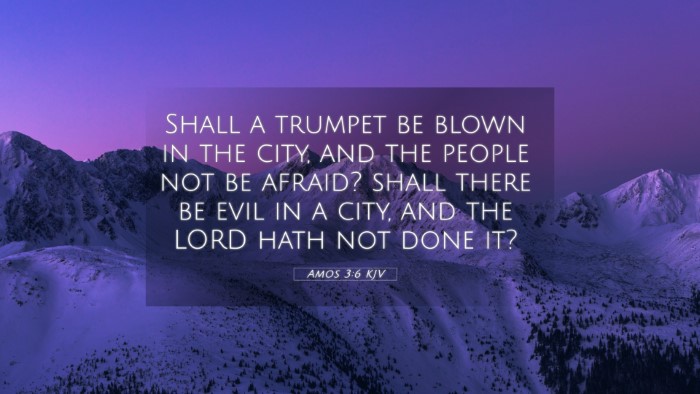Old Testament
Genesis Exodus Leviticus Numbers Deuteronomy Joshua Judges Ruth 1 Samuel 2 Samuel 1 Kings 2 Kings 1 Chronicles 2 Chronicles Ezra Nehemiah Esther Job Psalms Proverbs Ecclesiastes Song of Solomon Isaiah Jeremiah Lamentations Ezekiel Daniel Hosea Joel Amos Obadiah Jonah Micah Nahum Habakkuk Zephaniah Haggai Zechariah MalachiAmos 3:6 Similar Verses
Amos 3:6 Cross References
Shall a trumpet be blown in the city, and the people not be afraid? shall there be evil in a city, and the LORD hath not done it?
Uncover the Rich Themes and Topics of This Bible Verse
Listed below are the Bible themes associated with Amos 3:6. We invite you to explore each theme to gain deeper insights into the Scriptures.
Amos 3:6 Cross Reference Verses
This section features a detailed cross-reference designed to enrich your understanding of the Scriptures. Below, you will find carefully selected verses that echo the themes and teachings related to Amos 3:6 KJV. Click on any image to explore detailed analyses of related Bible verses and uncover deeper theological insights.

Isaiah 45:7 (KJV) »
I form the light, and create darkness: I make peace, and create evil: I the LORD do all these things.

Zephaniah 1:16 (KJV) »
A day of the trumpet and alarm against the fenced cities, and against the high towers.
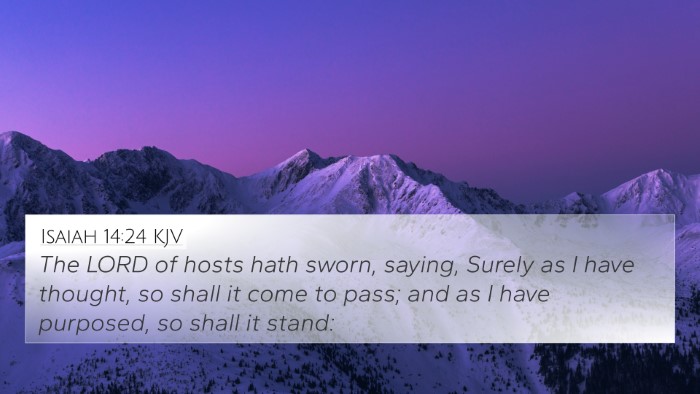
Isaiah 14:24 (KJV) »
The LORD of hosts hath sworn, saying, Surely as I have thought, so shall it come to pass; and as I have purposed, so shall it stand:

Genesis 50:20 (KJV) »
But as for you, ye thought evil against me; but God meant it unto good, to bring to pass, as it is this day, to save much people alive.
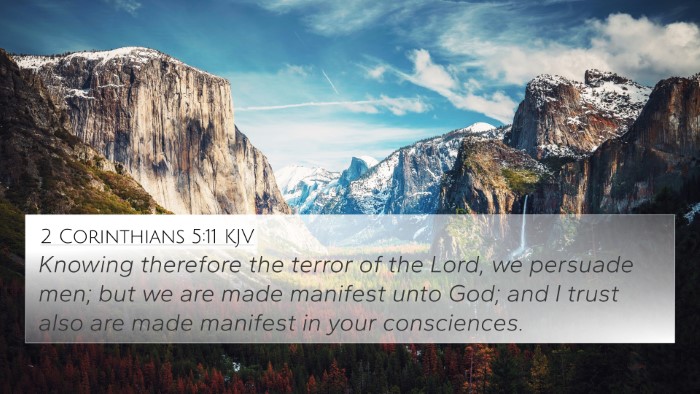
2 Corinthians 5:11 (KJV) »
Knowing therefore the terror of the Lord, we persuade men; but we are made manifest unto God; and I trust also are made manifest in your consciences.

Jeremiah 4:5 (KJV) »
Declare ye in Judah, and publish in Jerusalem; and say, Blow ye the trumpet in the land: cry, gather together, and say, Assemble yourselves, and let us go into the defenced cities.
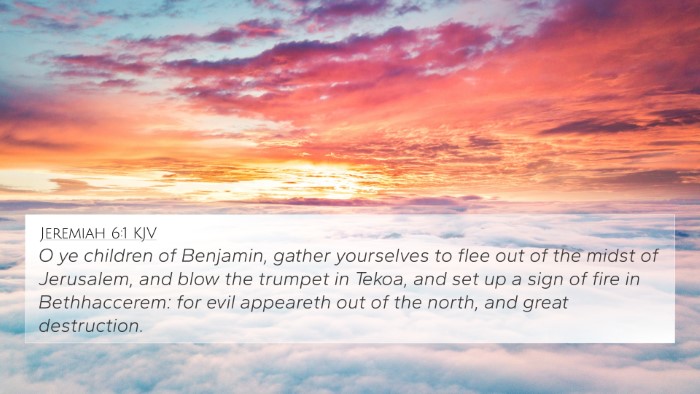
Jeremiah 6:1 (KJV) »
O ye children of Benjamin, gather yourselves to flee out of the midst of Jerusalem, and blow the trumpet in Tekoa, and set up a sign of fire in Bethhaccerem: for evil appeareth out of the north, and great destruction.

Ezekiel 33:3 (KJV) »
If when he seeth the sword come upon the land, he blow the trumpet, and warn the people;

Hosea 5:8 (KJV) »
Blow ye the cornet in Gibeah, and the trumpet in Ramah: cry aloud at Bethaven, after thee, O Benjamin.
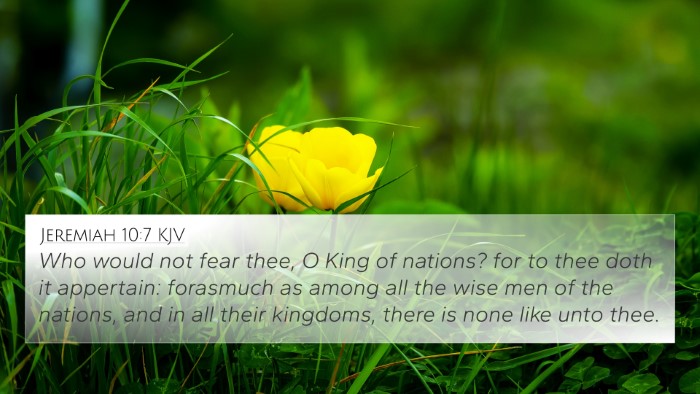
Jeremiah 10:7 (KJV) »
Who would not fear thee, O King of nations? for to thee doth it appertain: forasmuch as among all the wise men of the nations, and in all their kingdoms, there is none like unto thee.
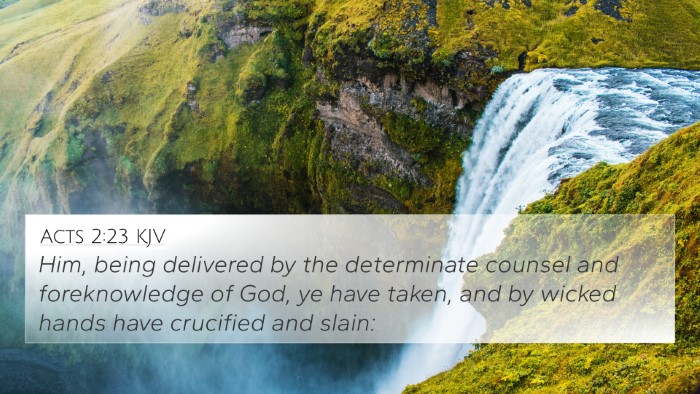
Acts 2:23 (KJV) »
Him, being delivered by the determinate counsel and foreknowledge of God, ye have taken, and by wicked hands have crucified and slain:

Jeremiah 5:22 (KJV) »
Fear ye not me? saith the LORD: will ye not tremble at my presence, which have placed the sand for the bound of the sea by a perpetual decree, that it cannot pass it: and though the waves thereof toss themselves, yet can they not prevail; though they roar, yet can they not pass over it?
Amos 3:6 Verse Analysis and Similar Verses
Understanding Amos 3:6
Amos 3:6 states, "Shall a trumpet be blown in the city, and the people not be afraid? shall there be evil in a city, and the Lord hath not done it?" This verse underscores God’s sovereignty over events, particularly calamities, and serves as a call to recognize His authority.
Verse Meaning Summary
Amos, a prophet of Israel, uses a rhetorical question to emphasize the reality of God's active engagement in the events of cities and nations. The blowing of a trumpet, traditionally a signal for alarm, hints at the seriousness of the coming judgment and evokes a sense of fear and reverence among the people.
Matthew Henry comments that this verse illustrates the inevitable warning of impending doom that accompanies divine judgment. The trumpet symbolizes an alert, and when it is sounded, it is essential for the people to respond appropriately with fear and respect for God's authority.
Albert Barnes enhances this understanding by highlighting that the phrase "evil in a city" refers to calamities which are either permitted by God or directly caused by Him. The Lord’s hand is evident in both the hardships faced by the people and the warnings provided through His prophets.
Adam Clarke further notes that the rhetorical questions are directed towards the nation of Israel to prompt introspection regarding their relationship with God and the consequences of their disobedience. Clarke suggests that the Lord’s actions are always deliberate, and disaster should compel the people to acknowledge their need for repentance and return to righteousness.
Key Insights from Commentaries
- Divine Sovereignty: The verse affirms that God oversees all events and that disaster does not occur without His knowledge or permission.
- Call to Repentance: Gideon’s blast from the trumpet urges the people to reflect on their ways and return to God.
- The Role of Prophets: The prophets serve as God’s messengers, alerting the people to what is to come and calling them to repentance.
- Disaster as a Warning: Evil or calamity serves not only as a punishment but as a means for correction and understanding God’s displeasure towards sin.
- Fear and Reverence: The sounding of the trumpet is both a warning and a call to cultivate fear—an awe-inspiring respect for God's power.
Bible Cross-References
This verse relates to several other Bible verses, connecting thematic elements of divine judgment, sovereignty, and calls to repentance:
- Isaiah 45:7: "I form the light, and create darkness: I make peace, and create evil: I the Lord do all these things." This emphasizes God's control over both good and evil.
- Lamentations 3:38: "Out of the mouth of the most High proceedeth not evil and good?" This complements Amos 3:6 by questioning the origin of calamity and good.
- Jeremiah 18:7-8: "At what instant I shall speak concerning a nation, and concerning a kingdom, to build and to plant it; if it do evil in my sight, that it obey not my voice, then I will repent of the good, wherewith I said I would benefit them." This establishes the conditional nature of God's blessings and judgments.
- Ezekiel 18:30: "Therefore I will judge you, O house of Israel, every one according to his ways, saith the Lord God. Repent, and turn yourselves from all your offenses..." Here the call for repentance is reiterated.
- Luke 13:4-5: "Or those eighteen upon whom the tower in Siloam fell, and slew them, think ye that they were sinners above all men... I tell you, Nay: but, except ye repent, ye shall all likewise perish." This demonstrates the New Testament parallel to the call for repentance amidst calamity.
- Romans 5:12: "Wherefore, as by one man sin entered into the world, and death by sin; and so death passed upon all men, for that all have sinned." This verse lays a foundation for understanding the consequences of sin which leads to disaster.
- John 9:1-3: "And as Jesus passed by, he saw a man which was blind from his birth. And his disciples asked him, saying, Master, who did sin, this man, or his parents, that he was born blind?" This interrogation reflects human tendency to correlate calamity with personal sin or divine punishment.
- 2 Corinthians 5:10: "For we must all appear before the judgment seat of Christ" This stresses accountability and aligns with Amos' themes of impending judgment.
- Hebrews 12:6: "For whom the Lord loveth he chasteneth, and scourgeth every son whom he receiveth." Here, divine correction is seen as a sign of love and is linked to the reasons for calamity.
Thematic Connections and Practical Applications
Amos 3:6 serves as a profound reminder of the interconnectedness of divine sovereignty and human responsibility. It is crucial for believers to understand how various scripture passages communicate similar themes regarding God's nature and His relationship with humanity.
This verse encourages seekers to delve into tools for Bible cross-referencing to uncover the rich tapestry of biblical truths that highlight God's sovereignty. By engaging in comparative Bible verse analysis, one can see the consistent message of repentance woven throughout the scriptures.
Additionally, when studying this passage, one might consider employing a Bible concordance or a cross-reference Bible study guide to identify similar themes and supportive scriptures, allowing for a deeper and more nuanced understanding of God's intentions as revealed through His word.
In conclusion, the insights drawn from Amos 3:6 remind us of the importance of listening to God's warnings, understanding the role of calamity in our spiritual journeys, and the call to recognize His sovereignty in every aspect of life.

